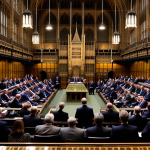Forecasting the Next Chapter in UK Politics
Understanding the current trajectory of UK politics requires careful examination of recent developments, including shifting voter preferences and legislative changes. Expert predictions increasingly rely on data-driven analysis, combining polling data, voting patterns, and demographic shifts to forecast outcomes. This approach enables a more nuanced grasp of how political trends might evolve.
Political trends in the UK suggest forthcoming alterations in government composition, with growing uncertainty about the balance of power between parties. For example, fluctuating support for major parties signals potential coalition arrangements or minority governments, which could reshape legislative priorities. These anticipated changes emphasize the importance of continuous monitoring of political trends to anticipate the future government’s formation and policy direction.
Topic to read : Enhance your living space using skylights for pitched roofs
Such forecasts are not mere conjecture; they are grounded in quantitative analyses and expert assessments that interpret complex social and economic indicators. Diligent study of these trends provides valuable foresight into challenges and opportunities the UK political landscape will face, helping citizens and policymakers prepare proactively for the evolving governance framework.
Shifting Party Dynamics and Emerging Political Forces
Recent UK political trends highlight a notable rise of emerging political parties challenging traditional dominance. These new parties leverage distinct policy platforms and grassroots support, reshaping the political landscape. For example, alternative parties focusing on environmental issues or regional autonomy have attracted voter segments dissatisfied with established options. This shift marks a significant evolution in party dynamics UK-wide.
Also to read : How Will Recent Changes in UK Parliament Affect Future Policies?
Alongside parties, new politicians are gaining prominence by connecting with younger and more diverse electorates. These figures often bring fresh perspectives, invigorating debates around governance and policy priorities. Their influence alters voter engagement, compounding shifts in party strength reflected in recent elections and polls.
Elections have demonstrated fluctuating support, with some emerging parties making incremental gains while established parties face challenges retaining their base. Political analysts observe that this redistribution of support could result in a more fragmented parliament. Such dynamics underscore the importance of monitoring party dynamics UK closely to understand how these developments will shape future government configurations and legislative agendas.
Key Social and Economic Factors Influencing UK Governance
The UK economy politics strongly influence the trajectory of governance, as economic stability, inflation rates, and employment figures remain central to political strategy. Rising inflation affects household budgets and spurs urgent government responses to ease the cost-of-living crisis, directly shaping policy priorities.
Social issues UK are equally pivotal. Increasing public concern over healthcare, education, and inequality feeds into the political discourse. Social movements advocating for change have pressured policymakers to address these challenges more transparently and effectively. This dynamic strengthens the link between public sentiment and legislative action.
Governance challenges in the UK now intertwine economic and social factors. Policymakers face the difficult task of balancing fiscal responsibility with the pressing need for social support. This intersection accelerates debates on welfare programs and public investment. Understanding these factors is essential to anticipate shifts in political priorities and voter expectations.
In summary, economic conditions and social movements form the backbone of current UK governance debates. They steer decision-making processes, influencing how the future government will tackle urgent challenges while maintaining political stability.
Brexit Aftermath and International Relations
Brexit’s impact on UK-EU relations remains profound, reshaping trade policies and regulatory frameworks. Since leaving the EU, the UK has sought to redefine its global role, balancing new trade agreements with maintaining access to European markets. This transition poses both risks and opportunities that directly influence economic and political stability.
Public opinion continues to evolve, reflecting concerns over supply chain disruptions and border controls, which affect sectors from agriculture to manufacturing. Governments must navigate these complexities to foster cooperation and minimize friction with the EU, the UK’s largest trading partner.
Internationally, Brexit encourages the UK to diversify partnerships beyond Europe, targeting markets in Asia, North America, and the Commonwealth. However, this shift requires careful diplomatic efforts and strategic negotiation to fortify the UK’s future government agenda and economic resilience.
In summary, Brexit’s aftermath enforces a recalibration of the UK’s foreign relations. Understanding these dynamics is crucial for anticipating how shifts in UK political trends will influence policy direction and international positioning in the coming years.
Expert Opinions and Data-Driven Forecasts
Expert analysis UK politics increasingly emphasizes the role of quantitative methods in understanding evolving UK political trends. Leading political analysts combine large datasets—such as polling numbers, demographic changes, and socioeconomic indicators—to generate nuanced forecasts of the future government composition. This approach improves the accuracy and reliability of predictions, moving beyond anecdotal observations.
Recent polling reveals fluctuating voter sentiments across regions and age groups, signaling potential shifts in party support. Predictive modeling often uses machine learning techniques to weigh these variables, creating scenarios that estimate likelihoods of different election outcomes. Such forecasts help identify emerging patterns, like the potential rise of coalition governments or the challenges minority administrations may face.
Think tanks and research institutes provide ongoing evaluations, aligning their forecasts with real-time political developments. Their expert analysis UK politics highlights how responsive governance structures might be to changing public preferences, offering policymakers strategic insights. By relying on political data, these experts underscore the interconnectedness of voter behavior, party dynamics, and policy priorities in shaping the next chapter of UK politics.
Forecasting the Next Chapter in UK Politics
Forecasting the next chapter in UK politics depends heavily on analyzing recent electoral outcomes and shifting public opinion. Current UK political trends reveal that voter preferences are fragmenting, with growing support for smaller parties and fluctuating loyalty to traditional powerhouses. This uncertainty contributes to complex projections about the future government, including the increased possibility of coalition or minority administrations.
Data-driven analysis is indispensable in interpreting these developments. By harnessing comprehensive polling data and demographic shifts, expert predictions offer nuanced insights beyond surface-level trends. These forecasts evaluate not only vote shares but also the interaction of regional variances and emerging voter concerns, which influence party strategies and alliances.
Anticipated changes in government composition reflect these dynamics. Experts suggest that no single party is likely to command an outright majority in the near term, intensifying negotiations around coalition building. This scenario reshapes power balances within Parliament and affects legislative priorities. Consequently, understanding these evolving UK political trends equips citizens and policymakers to anticipate governance challenges and opportunities with greater confidence and clarity.






